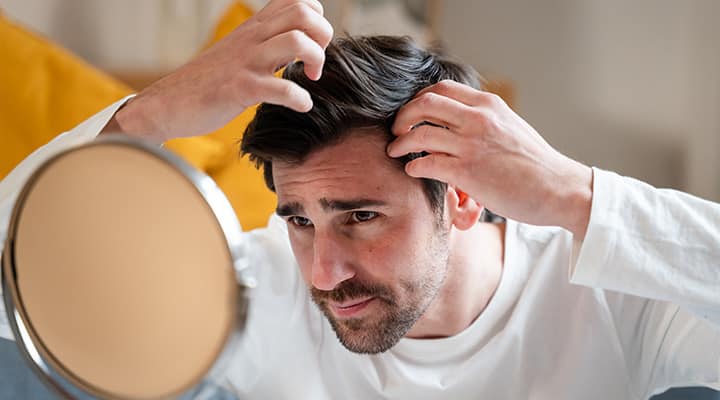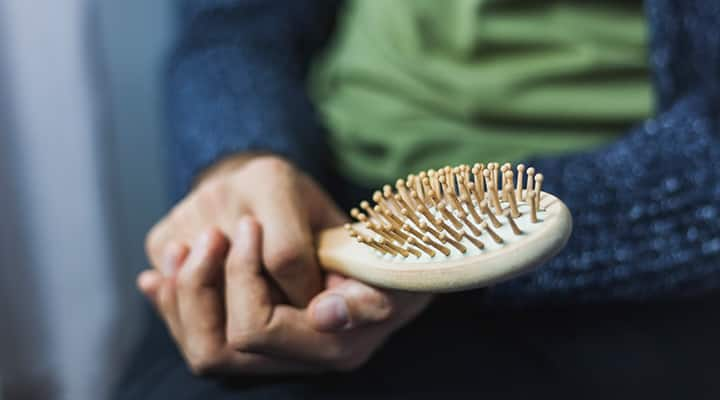
12 Best Hair Growth Supplements for Men
Published: April 2025
Let's be honest. The effects of thinning hair can be humbling, to say the least. And it doesn't discriminate—many men (and women, but that's another story) can be affected by a general thinning of hair as they age.
But you don't have to just grin and bear it! Certain nutrients might just help you and keep your existing hair healthy and luscious.
Learn more about what may be causing your hair thinning, hair growth supplements that can help you keep your hair healthy, and lifestyle changes you might want to consider making to grow more and thicker hair.
What causes thinning hair in men?
There are a few potential culprits of thinning hair in men:
Genetics
—Research says genetics and the male sex hormones—specifically, testosterone—can play a big role in hair development (and its eventual thinning). DHT, also known as dihydrotestosterone, is one of them. This hormone plays a role in the maintenance of hair follicles. This is why maintaining healthy levels is essential to your hair health. If you're not sure where you stand, getting your hormones tested can provide such valuable insight.Age
—It's probably not surprising, but hair thickness and amount change for both men and women as they age.Stress
—Stress, physical and emotional, can also cause hair shedding. If you notice hair shedding when you shampoo, comb, or run your hands through your hair, it might be stress-related.Haircare routine
—Be mindful of your self-care routine—over-shampooing your hair or wearing tight hairstyles that increase tension on the hair follicles can impact healthy growth.
How does the hair growth cycle work?
While you may not give much thought to hair growth on a daily basis, there are actually four phases to growing out your locks:
Anagen
—Also known as the growth phase, this can last for several years and is where new hair starts forming.Catagen
—The phase that follows active growth, this transition period for the hair typically only lasts about two weeks.Telogen
—Called the resting phase, this is when the hair essentially "takes a break" and stays dormant for a couple of months.Exogen
—This phase is characterized by old hair being pushed out as new hair grows in, ultimately leading to shedding of old strands for new ones to replace them.
Each hair follicle undergoes this cycle on its own and a single follicle can go through ten to 30 cycles in one lifetime, meaning different parts of your hair will be in different cycles at the same time.
Keeping the factors we discussed (like advancing age) in mind, hair can become thinner and fewer follicles spend time in the growing phase. The good news is that research indicates certain nutrients and plant extracts can help promote hair growth and density and reduce shedding.
Best hair growth vitamins for men
Vitamins and other nutrients keep us healthy, from head to toe (yes, that includes the hair on your head), and when we're lacking, we can feel the effects everywhere…including the hair growth cycle. Additionally, certain plant extracts and herbs have been studied for promoting hair growth.
Let's talk about nutrients we recommend that support healthy locks.
Black rice and prickly pear
—Black rice, which is naturally pigmented and high in anthocyanins, combined with prickly pear, may help support hair appearance, fullness and density. It may also support healthy hair follicle anagen (growth) and telogen (resting) phase.Saw palmetto
—Saw palmetto is an herb, and it makes a great supplement for men. It can promote urinary and prostate health and also support healthy testosterone levels. But that's not all. In one clinical study, saw palmetto extract supported the appearance of hair thickness for more than 50% of the participants taking it. It can also support healthy levels of DHT. Overall, this nutrient can support men's health in more ways than one.Biotin
—Biotin is a vitamin that is involved in lots of metabolic processes. One of those major roles that biotin plays is in helping produce keratin—the structural protein that helps form your hair, skin and nails.
Pro tip: Biotin is one of the more popular nutrients for hair health. You can find it in capsules, powder, tablets, liquid drops and gummies. In addition to taking this individually, you might also be able to find biotin in a multivitamin product or in a B-complex, or combined with antioxidants (like alpha-lipoic acid) in a single supplement. Besides supplementing, eat eggs and meat to get more biotin in your diet.
Fatty acids
—Not getting enough fatty acids has been associated with hair thinning. Increasing your intake of essential fatty acids—either through supplements or nutritional changes—as well as antioxidants may help improve hair density. (Try including more fatty fish in your diet!)Zinc—
Low zinc levels may be associated with thinning hair. Aside from supplements, you can find zinc in oysters and beef.Protein
—You might hear "protein" and think of chicken, but there are many types (and sources) of protein. All types of protein can promote hair health, including plant and animal proteins. Your body needs all of the essential amino acids, which are the building blocks of protein, in order to build keratin and fight hair thinning.Iron
—Low on iron? It could be playing a role in your hair health. You can find it in red meat, seafood and eggs.Vitamin D
—A lack of vitamin D, commonly known as the sunshine vitamin, could be making it harder for your body to produce (and hang on to) thick, healthy hair.Vitamin E
—Tocotrienols are one form of vitamin E, and they may be able to promote healthy hair. Munch on sunflower seeds or almonds, or find vitamin E in a high-quality supplement.Selenium
—Increasing your selenium intake may support healthy hair follicles, which are a must for hair growth.Collagen
—Collagen peptides can support healthy hair growth and keep your skin and nails looking nourished. You can sometimes find supplements that combine collagen and biotin.Niacin
—A lack of niacin, also known as vitamin B3, could be connected to your hair health. Much like biotin, niacin can be found in multivitamin and B-complex formulas.
Explore Our Best Men's Health Supplements
Do men’s hair growth supplements really work?
Let's get one thing out of the way: Taking these supplements if you're already getting enough of them in the first place (from diet and/or supplementation) likely won't yield a significant change. However, supplements can be helpful for supporting your hair health if you know you're not getting enough of a specific vitamin or mineral. It's an easy way to fill in nutritional gaps.
Be sure you don't fall for the latest fads. When it comes to actually addressing those nutritional needs, it's crucial to be discerning with your supplements. This means only taking formulas from trusted companies that use clinically studied ingredients.
One gentle word of advice: Avoid over-supplementing in your quest for your healthiest mane. You might think that taking more of a supplement will simply support hair growth even more, but too much of a good thing can be a bad thing. Remember to always read and follow the product label's instructions.
What lifestyle habits can support men’s hair growth?
First, before considering what product to take, we recommend getting your levels of hormones and other nutrients tested. This can help determine what you may need to help fill in the gaps.
Aside from evaluating any potential nutrient needs and supplementing appropriately, you should be gentle with your hair when you're washing and conditioning. Using a leave-in conditioner afterward can help you to avoid breakage and split ends. It's good for tackling frizz, too.
Use a blow dryer sparingly, since excessive heat won't do anything to help your hair health, and try to use it on the lowest setting. Additionally, avoid pulling your hair back too tight. This can lead to unnecessary breakage and doesn't feel great on your scalp, either.
Speaking of your scalp, it plays a big role in your hair growth! If you're looking for specialized daily support, it would benefit you to speak with your healthcare provider or a hair specialist for more specific guidance.
And of course, making other healthy lifestyle choices can support your hair health:
- Eat a colorful, nutrient-dense diet and stay hydrated
- Avoid smoking and drinking
- Get enough high-quality sleep
- Try to move your body daily
- Find healthy ways to cope with stress
Patience is key
One thing that can be a little frustrating is that you probably want to see results overnight, but with hair growth, that's (unfortunately) not how our bodies work.
If you want to grow thicker, stronger hair, you should plan to give it at least a few months to see any results. This goes back to how your hair grows in cycles. Remember, the phases of the cycle span weeks to years. That's why you might not notice the effects for a few months or longer.
Taking your nutrients/hair growth products daily (or as recommended) and being gentle with your scalp and hair on a regular basis are vital for seeing results. If you're getting the necessary vitamins and minerals and making smart wellness choices each day, you're going to feel the benefits beyond your tresses!
References
- Cestone E, et al. "Efficacy of Oryza Sativa L. (Black Rice) and Opuntia Ficus Indica L. Blend in Men with Androgenetic Alopecia: A Randomized, Double-Blind, Placebo-Controlled Clinical Trial." Journal of Cosmetology & Tricology. 2023. https://www.hilarispublisher.com/open-access/efficacy-of-oryza-sativa-l-black-rice-and-opuntia-ficus-indica-l-blend-in-men-with-androgenetic-alopecia-a-randomized-do.pdf
- Lalosevic J, et al. "Serum Zinc Concentration in Patients with Alopecia Areata." Acta Derm Venereol. October 2023. https://pmc.ncbi.nlm.nih.gov/articles/PMC10561101/
- Le Floc'h C, et al. "Effect of a nutritional supplement on hair loss in women." J Cosmet Dermatol. March 2015. https://pubmed.ncbi.nlm.nih.gov/25573272/
- Natarelli N, et al. "Integrative and Mechanistic Approach to the Hair Growth Cycle and Hair Loss." J Clin Med. January 2023. https://pmc.ncbi.nlm.nih.gov/articles/PMC9917549
- Sudeep HV, et al. "Oral and Topical Administration of a Standardized Saw Palmetto Oil Reduces Hair Fall and Improves the Hair Growth in Androgenetic Alopecia Subjects – A 16-Week Randomized, Placebo-Controlled Study." Clin Cosmet Investig Dermatol. November 2023. https://pmc.ncbi.nlm.nih.gov/articles/PMC10648974/
- "Hair Loss (Alopecia)." Penn Medicine. https://www.pennmedicine.org/for-patients-and-visitors/patient-information/conditions-treated-a-to-z/hair-loss-alopecia-areata
- "Hair Loss: Tips for Managing." American Academy of Dermatology Association. https://www.aad.org/public/diseases/hair-loss/treatment/tips
- "Male Pattern Baldness." Penn Medicine. https://www.pennmedicine.org/for-patients-and-visitors/patient-information/conditions-treated-a-to-z/male-pattern-baldness
Like what you read?
Please subscribe to get email updates on this blog.











